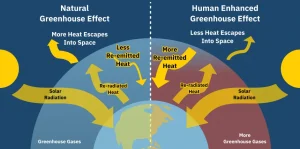
Climate can be defined as the collective state of the atmosphere for a given place over a specified interval of time. There are three parts to this definition: location, because climate can be defined for a globe, a continent, a region or a city; time, because climate must be defined over a specified period; and the collective state of the atmosphere, which includes averages and extremes of variables such as temperature, precipitation, pressure and winds.
Climate change is a long-term change in the average weather patterns that have come to define Earth’s local, regional and global climates.
Climate change can result from natural events, such as volcanic eruptions, asteroid impacts or changes in our sun’s energy output.
Climate change can also be caused by human activities. The building of cities is a well-documented example of inadvertent modification of a climate by human activities. The urban heat island effect refers to the increased temperatures of urban areas compared with a city’s rural surroundings. Several factors contribute to the relative warmth of cities, such as heat from industrial activity and the thermal properties of buildings and roads.
Since the 1800s, human activities have been the main driver of observed climate change, primarily due to the burning of fossil fuels such as coal, oil and gas. Burning fossil fuels generates greenhouse gases, which are transparent to solar radiation but absorb large amounts of terrestrial infrared radiation that results in warming the atmosphere.
Over the past two centuries, the global average surface temperature has increased noticeably. Currently, Earth is about 2.11 degrees Fahrenheit warmer than the late 19th-century preindustrial average. The 10 most recent years are the warmest on record. There is no debate about the cause of this warming trend; it has resulted from human activities, principally through emissions of greenhouse gases.
Steve Ackerman and Jonathan Martin, professors in the UW-Madison department of atmospheric and oceanic sciences, are guests on WHA radio (970 AM) at noon the last Monday of each month. Send them your questions at stevea@ssec.wisc.edu or jemarti1@wisc.edu.

